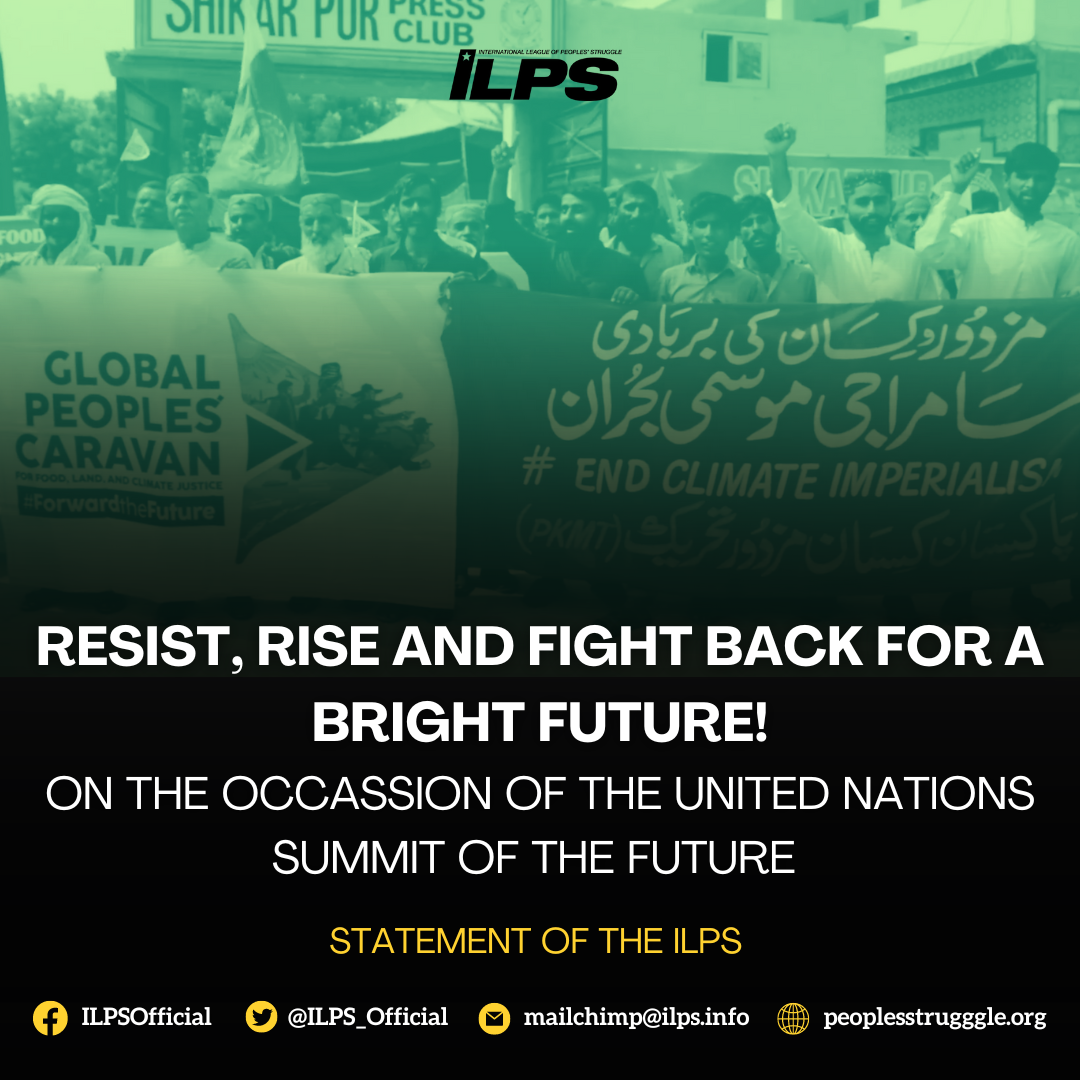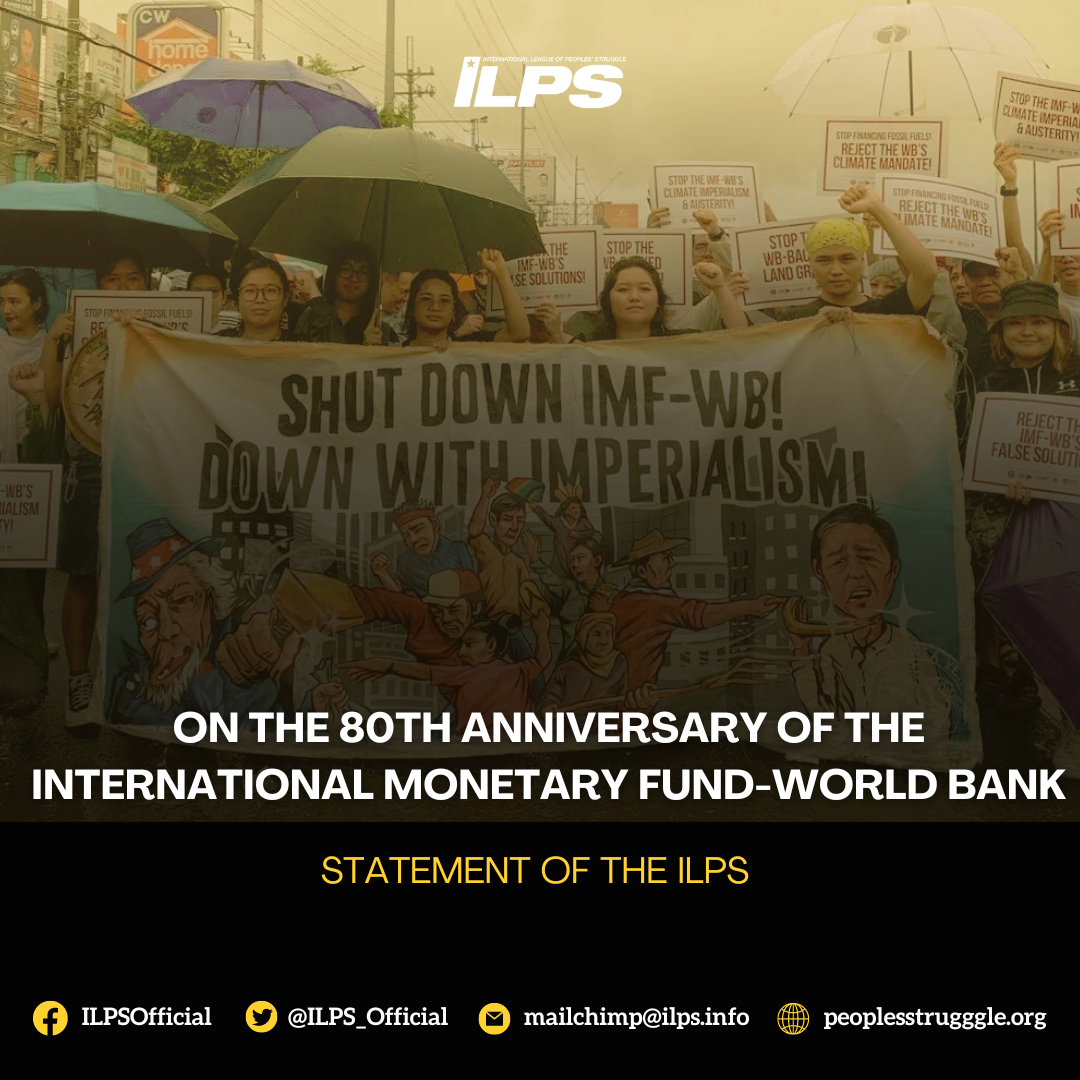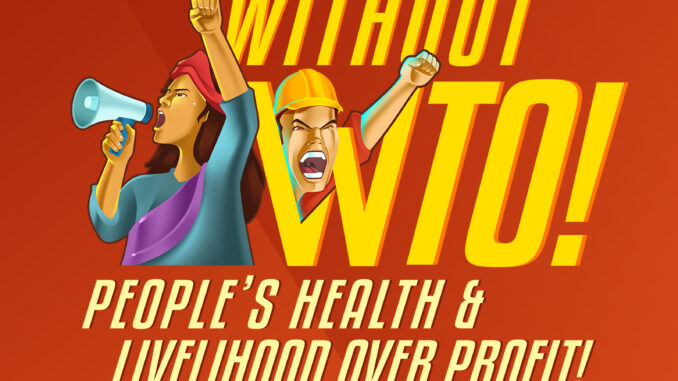What is the IMF-WB?
With the end of World War II, the US benefited from the weakening and destruction of the other imperialist powers in the war and took control of the post-war imperialist order across the globe. The US formed the IMF-WB in 1945.
The WB Group consists of 5 organizations: IBRD -International Bank for Reconstruction and Development; IFC – International Finance Corporation; IDA – International Development Association; MIGA – Multilateral Investment Guarantee Agency; ICSID – International Centre for Settlement of Investment Disputes.
The IMF serves to control underdeveloped countries’ economies and fiscal policies, including the exchange value of local currencies. The WB’s main role is to disburse the funds for developing countries under several conditionalities.
THE US and THE IMF-WB
The US has a controlling minority share of 16.5 per cent in the WB and dictates its policies with the support of other advanced capitalist countries.
The US, as the most dominant imperialist power, perpetuates its political and economic prowess over underdeveloped countries by making them dependent on foreign debt and foreign direct investments.
As a Tool of Imperialism
The IMF and the World Bank prevent client-states from truly developing their economies through a planned balance of national industrialization as the lead factor, land reform as a means of liberating and making the peasants more productive, creating a larger domestic market and the appropriate measure of infrastructure building.
In the unequal exchange of raw material exports and manufactured imports, foreign corporations (supported by the IMF-WB, together with elite governments) extract enormous profits but client-states always suffer from budgetary and trade deficits, which require foreign loans to cover.
Debt service payments to imperialist banks and profit remittances by corporations keep client-states underdeveloped, impoverished and subservient to the imperialist master-state.
The World Bank’s “Maximizing Finance for Development” approach and the push for “de-risking” private sector investments facilitate the corporate capture of development.
In selling the MFD approach to borrower countries, the WB Group imposes the presumption that private and public interests are essentially aligned, and that ensuring corporate profits serves people’s welfare and sustainable development.
On Debt
IMF-WB lends to states to influence their policies. They impose neoliberal policies on the South through conditionalities attached to loans which ultimately drain the South of its resources and redirect them towards the North.
In sub-Saharan Africa, publicly-owed or guaranteed foreign debt rose to nearly $500 billion by the end of 2018 (according to the latest data), with the median at 56 per cent of GDP, (increase from 38 per cent a decade earlier). These figures continue to soar because of Chinese loans and other foreign debt borrowed by corporations.
On Austerity
IMF has imposed economic policies on states as part of so-called fiscal consolidation strategies for “economic recovery” after the 2008 global financial crisis. These are imposed through conditionalities attached to loans.
Austerity measures include increase in debt repayments coupled with cutbacks on social spending, privatisation of social services, strengthening of public-private partnerships, the freezing or lowering of minimum wages, regressive and indirect taxes.
All this has resulted in: labor informality; severe impacts on lower income households as a result of reduced food subsidies and social spending cuts; exacerbates gender inequality resulting from increase in unpaid domestic work; overall, generational inequities.
A 2019 UN Independent Expert report on IFI (international finance institutions) complicity in retrogressive economic measures found a “direct causal link between austerity and human rights violations” according to standards of international law.
On Covid-19, IMF’s austerity policies led to a shortage of health workers, and collapse of health systems such as in Ecuador ‘s case.
Successful campaigning
People’s Global Conference 2018
Peoples Global Conference 2018, Bali Indonesia – “Shut Down the IMF-World Bank, Not the People’s Dissent! Fight for People’s Right to Development!”
PGC asserted that a world without IMF-WB and the exploitative and oppressive global political and economic order that they perpetuate is not only possible; it is necessary and urgent in order to reclaim our rights and future as a people. It was held coinciding with the IMF-WBG Annual Meetings to counter the false narratives of these multilaterals. Participated by 93 organizations from 18 countries, coming from various sectors such as workers, peasants, fisherfolk, indigenous peoples, migrants, women, and youth. It pushed through with the program and protests despite the threats and harassment from state forces in Indonesia. News media covered the protests causing state forces to defend their position even more. The PGC met its objectives and was able to forge solidarity across the world.
Success Stories
Chico Dam 1985
The indigenous peoples of Kalinga and Mountain Province successfully opposed the US$50 million World Bank-funded Chico River Irrigation Project, also known as the Chico Dams Project, from 1976-1985. The martyrdom of Macling Dulag in the resistance has long been a source of inspiration to resist imperialist forces and to assert their self-determination over their land.
Save the Bisri Valley 2020
World Bank agreed to extend a loan of $474 million, to pursue the dam in Bisri Valley making it one its largest projects in Lebanon. The campaign against the proposed dam criticizes the project on environmental and safety grounds but goes further by focusing on water management, public policy and development strategies, as well as the politics behind dams in Lebanon.
In June 2020, WB announced the cancellation of its loans for the project. Activists and civil society have campaigned against the projects for years and have proposed instead for the site to be turned into a nature reserve and for the already allocated loan funds to be diverted to other projects.
Uganda Transport Sector Development Project 2015
After a protracted advocacy campaign, the World Bank cancelled the TSDP, which had also been riddled with concerns over road safety, compensation for land acquisition and sexual harassment of female employees.
Congo Inga-3 Basse Chute Technical Assistance Project 2016
The World Bank Group cancelled its support to the Inga-3 Basse Chute & Mid-Size Hydropower Development Technical Assistance Project in the DRC. A vibrant and growing civil society movement is demanding the immediate and equitable development of DRC’s abundant resources to finally deliver much-needed energy access to the Congolese people.
On COVID-19 lending and directions and trends under the “New Normal”
The IMF_WB “new normal” is to refuse to cancel debts and to provide COVID-19 lending instead of grants. It continues its sustainable development agenda (“inclusive and sustainable development”). It re-badges its “green credentials” by re-naming the pre-pandemic “Green New Deal” as “building back better” for “a greener, smarter, and fairer” economy. It wants to accelerate the power of Big Tech through “Digitalization”. While promoting “social protection” it pushes for its decades-long neoliberal policies.
On COVID-19 lending
The IMF has declared a USD 1 trillion capacity to lend – of which billions are already listed for more loans on terms lower than market rates. In July 2020) the IMF announced USD 11.3 billion of IMF COVID-19 money would be used by 28 countries at high risk of debt to pay private sector debt. As of Sept 2020, it had approved loans to around 80 countries through “emergency lending or precautionary lending tools”. It initiated new loan programs with Egypt, Ukraine, Jordan, Pakistan and Ecuador, among others, with “rigid fiscal targets” that hinder these states from using resources to address COVID-19.
World Bank
The World Bank has offered only USD 14 billion in emergency financing, but declared in May 2020 that USD 160 billion in new concessional loans and grants will be made available in the next 15 months to “maintain the private sector” and economic recovery.
As of July 2020, the World Bank received USD 1.7 billion in debt repayments from DSSI (debt service suspension initiative) countries, but committed only $1.9 billion in new funding for COVID-19 responses. Only $250 million was disbursed by the end of May 2020.
It approved USD 500 million under the Third Disaster Risk Management Development Policy Loan; a USD 100 million loan for the Philippines COVID-19 Emergency Response Project; and a USD 500 million loan for COVID-19 responses including support to the poor and to small and medium enterprises. However, according to IBON Foundation, these are/will be used to support big businesses (in the “form of tax deferrals, low-interest loans, and credit guarantee schemes”), Build, Build, Build (BBB), foreign investment attractions, tourism.
Directions and trends under the “new normal”
IMF
The IMF is promoting “Green” infrastructure and energy as business opportunities, and “Digital transformation” as opportunity for e-commerce, e-learning, e-transfers, e-payments, and e-governance. It claims to “support countries’ efforts in calibrating their social policies to reduce inequality, protect vulnerable people” (ex. through temporary targeted cash transfers). It has adopted a ‘lend now, worry later’ approach, but retained the medium-to-long-term fiscal consolidation targets amid the crisis.
World Bank
The World Bank is promoting “sustainable energy at the heart of economic stimulus and recovery measures” but its rhetoric is contradictory to continued financing of dirty energy. Its climate financing is comprised of more loans for PPP projects. It calls for “improving” education and health by public spending, while simultaneously working with “the private sector”. It’s “Digital Revolution” includes a “more inclusive, resilient and sustainable” food system -“agtech”. This is all about maintaining its private-sector-first approach – Maximising Finance for Development.
Campaign calls
●End corporate capture of development; Uphold people’s rights and welfare.
●Stop financing dirty energy. No to socially and environmentally-destructive climate change solutions. No to corporate climate solutions! People-powered climate action now!
●Debt cancellations now to public and private creditors. Grants not loans for COVID-19 responses.
●Governments – Stop squandering people’s taxes on IMF-World Bank loans! Prioritise people’s rights and welfare!
●Reverse health privatization and strengthen public health systems to provide genuinely universal coverage.
●Reclaim our health, rights, and future! Fight for the people’s right and welfare! Resist corporate bailouts and sham “recovery”! Shut down IMF-World Bank!
References
●The 2018 People’s Global Conference Against the International Monetary Fund and World in Bank in Bali Indonesia
●IBON International’s The World Bank Group’s Corporatization of Development
●Policy Brief on “New Normal”
●https://www.imf.org/en/News/Seminars/Conferences/2020/09/11/091620-md-friends-of-europe
●https://www.brettonwoodsproject.org/2020/07/the-imf-and-world-bank-led-covid-19-recovery-building-back-better-or-locking-in-broken-policies/
●https://www.brettonwoodsproject.org/2020/08/world-banks-rating-obsession-will-negate-debt-justice/
●https://www.brettonwoodsproject.org/2020/07/imf-watchdog-releases-covid-19-tracker/
●https://www.worldbank.org/en/news/immersive-story/2020/09/08/5-years-of-climate-leadership-the-world-bank-groups-first-climate-action-plan
●https://www.worldbank.org/en/news/immersive-story/2020/08/06/beyond-the-pandemic-harnessing-the-digital-revolution-to-set-food-systems-on-a-better-course
●https://www.arab-reform.net/publication/stopping-the-bisri-dam-from-local-to-national-contestation/
●https://www.middleeasteye.net/news/lebanon-world-bank-bisri-dam-loan-cancelled
●https://home.crin.org/latest/childrens-rights-at-the-world-bank-bic
●https://cramanipur.wordpress.com/2018/10/23/chico-once-more-legacy-of-resistance-in-cordillera-highlands/
●https://www.worldbank.org/en/news/press-release/2016/09/22/world-bank-group-cancels-financing-to-the-inga-3-basse-chute-technical-assistance-project
●https://www.internationalrivers.org/where-we-work/africa/congo/
●https://meetings.imf.org/en/2020/Annual/About
●https://actionaid.org/news/2020/covid-19-crisis-imf-told-countries-facing-critical-health-worker-shortages-cut-public
●https://www.brettonwoodsproject.org/2020/07/the-imfs-role-in-the-devastating-impacts-of-covid-19-the-case-of-ecuador/
●https://www.imf.org/en/Topics/imf-and-covid19/COVID-Lending-Tracker#REGION
●https://blogs.imf.org/2020/09/17/imf-lending-during-the-pandemic-and-beyond/
●https://www.theguardian.com/business/2020/jul/16/dollar-11bn-in-imf-covid-19-money-being-used-to-service-debt-says-group-private-lendwers-poorest-nations
●https://www.worldbank.org/en/news/press-release/2020/05/19/world-bank-group-100-countries-get-support-in-response-to-covid-19-coronavirus
●https://www.ibon.org/ph-debt-alls-well-that-swells/
●https://iboninternational.org/2019/10/15/on-the-complicity-of-the-imf-other-ifis-in-violating-people-s-economic-rights-today/
●https://www.opendemocracy.net/en/oureconomy/imf-and-world-bank-have-lost-all-legitimacy-we-need-new-alternatives/




[…] IMF-WB as a tool of IMPERIALISM → […]